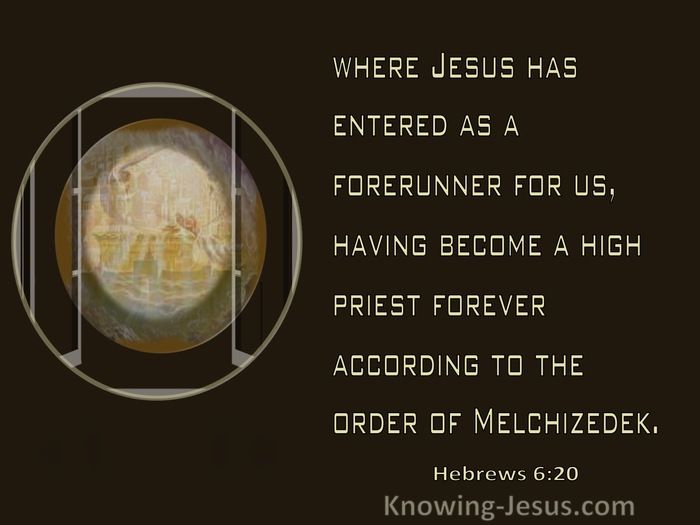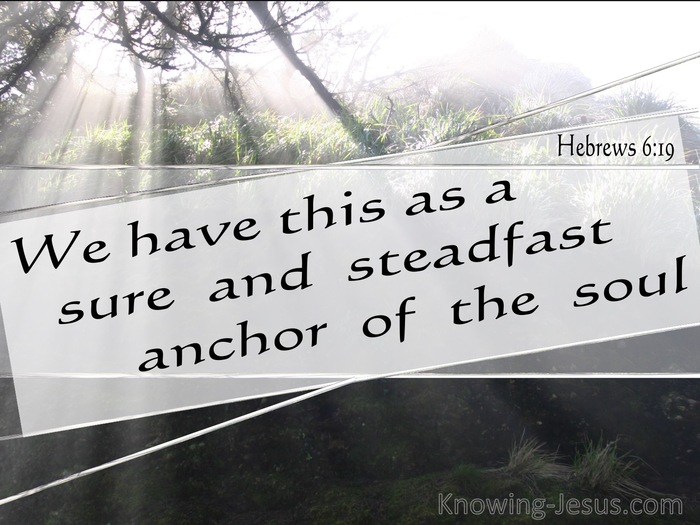7 Bible Verses about Forerunners
Most Relevant Verses
where Jesus, our forerunner, [already] entered on our behalf, having become a Head Priest forever according to the order of Melchizedek.
He will go on ahead of the Messiah [See verse 76], in the spirit and power of Elijah, to rekindle the affections of fathers for their children, and [to influence] disobedient people to live wisely like righteous people. And he will prepare the people to be ready for [the coming of] the Lord."
He is the one about whom it was written [Mal. 3:1], 'Look, I [will] send my messenger on ahead of you. He will prepare the pathway in front of you.'
Yes, you [my] child [i.e., John], will be called the prophet of the Highest [i.e., God], for you will go ahead of the Lord's presence to prepare His ways.
It was even written in Isaiah, the prophet [Note: Verse from Isa. 40:3], "Look, I am sending my messenger on ahead of you. He will prepare the way for you. John [the Immerser] came immersing people in the desert and proclaiming that those immersed on the basis of their repentance would receive the forgiveness of sins [from God].read more.
And people from throughout all the regions of Judea and all of Jerusalem went out to John [in the desert]. And he immersed them in the Jordan River as they confessed their sins. John wore clothing made of camel's hair and he had a leather belt around his waist. He ate grasshoppers and wild honey. In his preaching John said, "One who is more powerful than I am will follow my ministry. I am not [even] worthy to stoop down and loosen the straps of His sandals [i.e., to serve as His slave]. I am immersing you in water, but He will immerse you in the Holy Spirit."
Now it was the fifteenth year of the reign of Tiberius Caesar. Pontius Pilate was governor of Judea, Herod was ruler of Galilee, his brother Philip was ruler of the regions of Ituraea and Trachonitus [Note: These two men were sons of Herod the Great (See Matt. 2:1) and ruled over provinces east of the Jordan River] and Lysanias was ruler of Abilene [Note: This was a province just north of the two previously mentioned ones]. [During this time], while Annas and Caiaphas [Note: This man was Annas' son-in-law. See John 18:13] were head priests, God's message came to John [the Immerser], son of Zacharias, [when he was] in the desert [of Judea]. He went into the whole region around the Jordan River proclaiming that those immersed on the basis of their repentance [i.e., determining to change their hearts and lives] would receive the forgiveness of sins [from God].read more.
This was according to what is written in the book containing the words of Isaiah, the prophet [Isa. 40:3ff], "The voice of a man who speaks out in the desert [urging people] to make the road for the Lord ready [for Him to travel]; to make a straight pathway for Him [to walk on]. Every valley will be filled up and every mountain and hill will be leveled. And crooked [roads] will become straight and rough ones smoothed out. And all mankind will see the salvation of God [i.e., become available to them]." He said to the crowds of people that went out [to the desert] to be immersed by him, "You children of snakes, who warned you to run away from the coming wrath [of God]? Demonstrate by your lives that you have [really] repented, and quit saying to yourselves, 'We claim Abraham as our forefather,' because I tell you, God is able to make Abraham's children out of these stones. And even now the axe is also ready to chop down the trees at their roots [i.e., you Jews]. Every tree [i.e., person] that does not produce wholesome fruit [i.e., a godly life] will be cut down and thrown into the fire [i.e., the punishment of hell]." Then the crowds asked him, "What then must we do [i.e., to demonstrate our repentance]?" And he answered them, "The person who has two coats should give [one of them] to the person who does not have any; and the person who has food should do the same thing." Then some tax collectors came to him to be immersed and asked him, "Teacher, what must we do [i.e., to demonstrate our repentance]?" And he answered them, "Do not collect any more [tax money] than you are required to." Some soldiers on duty also asked him, "And what must we do [i.e., to demonstrate our repentance]?" And he answered them, "Do not force people to give you money or accuse them falsely, and be content with your pay." Now as people were anticipating [what would happen] and everyone was wondering in their hearts if perhaps John were the Christ [i.e., God's specially chosen one], John answered [their concerns] by saying to all of them, "I am [the one] immersing you in water, but One who is more powerful than I will follow my [ministry]. I am not [even] worthy to loosen the straps of His sandals. He will immerse you people with the Holy Spirit and with fire [i.e., the punishment of hell. See Matt. 3:10-12]. His separating shovel is in His hand and He will completely clear off His threshing floor [i.e., by removing all of the husks]. And He will gather the wheat into His barn, but will burn up the husks with a fire that will never go out." So, John preached the good news to the people with many different appeals. But because he had rebuked Herod, the tetrarch, for [marrying] his brother's wife Herodias, and for all the other bad things he had done, to top it off, Herod put John in prison.
We have this hope as an anchor for the soul, [a hope] that is safe and secure, and one that enters the curtain [i.e., figuratively, of the heavenly sanctuary], where Jesus, our forerunner, [already] entered on our behalf, having become a Head Priest forever according to the order of Melchizedek.


